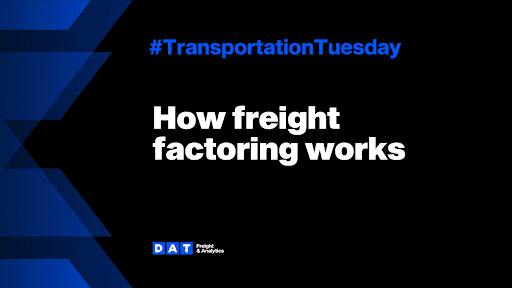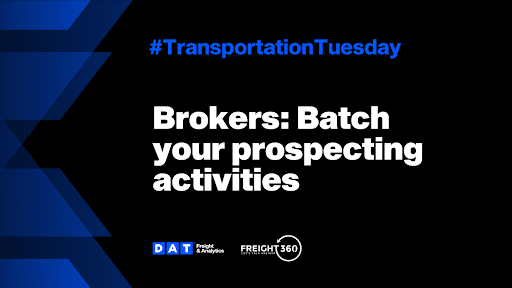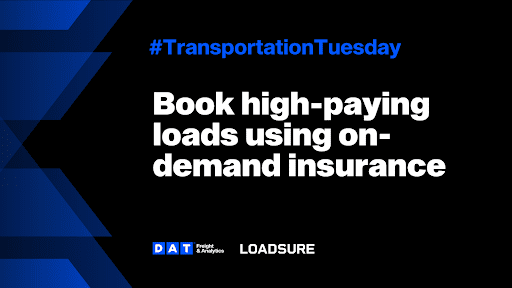Read more from our Transportation Tuesday series.
Freight factoring is not only a lifesaver when it comes to preserving budgets and avoiding going into debt, but it’s also pretty simple. The exact process may vary from company to company, but most freight factoring businesses follow a similar model.
The freight factoring process starts with searching for a load that fits your operation. Once you find a match, the only action needed before booking the load is confirming that the customer is approved by your factor. Major factoring companies usually have an instant credit check option, making it easy to find trustworthy customers and business partners. Factors typically only require basic information like the broker’s name or motor carrier number (MC#) to confirm that a customer is approved.
For this approval process, it’s convenient to work with a factor that’s partnered with your load board. DAT has partnered with OTR Capital, streamlining the factoring process by allowing you to see which brokers and loads OTR Capital has pre-approved on the load board before booking.

Once your factor approves your broker and you book your load, you can start delivering. When the job is done, you’ll send any relevant information like invoices, rate confirmations, proof of delivery (POD) and other paperwork associated with the load to your factoring company through email, an online portal or a mobile application.
Your freight bill factoring company will deposit some, or all, of the money your supplier owes into your account (minus their small service fee). This typically takes place within 24 hours of receiving your documents. Then, your factoring company owns the invoice and will collect payment from your customer, leaving you free to pick up your next load.
If you’re operating on a recourse factoring policy, you’ll need to reimburse your factoring company if your broker doesn’t pay. On the other hand, having a non-recourse factoring policy means your factoring company will assume the risk should your broker or shipper go bankrupt, pay late, or refuse to uphold their end of the deal.
While non-recourse factoring may seem like the obvious choice, it also means higher fees. So, you need to know your business and your customers well to properly weigh your options. Also, make sure to read your contract carefully. Some factoring companies advertising non-recourse factoring only absorb the costs of a non-paying customer if the customer files for bankruptcy — which is to say once in a blue moon. For true non-recourse factoring, consider factoring with OTR Capital. When you choose an OTR Capital non-recourse factoring program, OTR Capital will take the credit risk, protecting you from bad debt and offering you peace of mind.
What is the purpose of factoring companies?
The purpose of factoring is simple: To help carriers or owner-operators who face cash flow problems receive payments faster. The costs of daily operations for trucking companies can add up fast and waiting months for the payments you already earned is simply unfeasible in many circumstances. Factoring companies address that problem by paying carriers upfront for their invoices so they can continue their daily operations without a problem.
Beyond simply getting you the funds you need fast, the purpose of factoring companies is to support trucking companies and carriers. To that end, some factoring companies offer additional services like fuel cards and back office and accounting support.
Why do trucking companies use factoring?
Now that we’ve covered the basics of factoring, it’s time to dive into the key question: “Why do I need factoring?” This is a personal question that is answered on a company-by-company basis. To make it easier for you to answer that question for yourself, here are some of the reasons why trucking companies often rely on freight factoring:
- Cash flow assistance: This is the biggest reason trucking companies use factoring. Simply put, it lets you get the cash you earned without creating any debt. Not only is getting a bank loan an unnecessary hassle, getting one to fund your receivables may then interfere with your ability to get more loans for bigger expenses when you need them, like trucks or other necessary equipment. Plus, with freight factoring, you get funding based on the creditworthiness of your customers, not your own credit.
- Fast and flexible funding: Factoring gets you the cash you already earned FAST. Instead of waiting anywhere from 30 to 90+ days to get paid for the work you already did, factoring gets you the money you earned within hours of submitting an invoice. Carriers can pick which invoices to factor on a per-customer basis. If a particular customer reliably pays on time, you might not need to factor their invoices. But in cases where factoring is appealing, you’ll be able to assign all future payables from a customer to the factor.
- Back office support and efficiency: When you sell your invoice to the factoring company, it means you’re no longer responsible for it. For companies that want to reduce their administrative workload, factoring is a great solution. You no longer need to take care of invoicing your customer or follow up with them about collections. Your factoring company will even take care of broker disputes for you.
- Reduced risk: True non-recourse factoring — the kind you can only find by working with OTR Capital — eliminates the risks of bad debts. Once the factoring company determines that a customer is creditworthy and takes on your invoice, the money you get is yours to keep even if the broker doesn’t pay.
- Ability to haul more loads: Many companies choose to factor because an increased cash flow means an increased ability to pay off expenses, which means you can haul more loads. With increased cash flow, companies can invest in new trucks, new carriers and more — all of which can help you grow your business fast.
- Additional benefits: From fuel advances and fuel cards to added peace of mind and reduced stress, factoring comes with many secondary benefits that appeal to companies that want to factor.
Can you cancel or terminate your freight factoring contract?
If you think you don’t have a freight factoring contract, think again. Even if your factoring company markets itself as a no-contract factoring option, there’s always a contract. And that’s a good thing. Having a contract in place will benefit you and your factoring company by ensuring you know exactly what you’re getting into. It also helps keep you on the same page about rates, contract duration and more.
Factoring companies always include a timeframe in their contracts, meaning you’ll have to wait a minimum amount of time after starting to factor before you can terminate or cancel your factoring partnership. But getting out of a contract isn’t as simple as waiting for the contract’s duration to end — contracts auto-renew! For example, a one-year contract with a factoring company will automatically renew for another year at the end of the first term. If you want to stop factoring with a specific company, you’ll need to terminate your freight factoring contract proactively.
One of the many benefits of freight factoring contracts is that they’re tailored to your specific company’s needs. However, that uniqueness also means that there’s no one-size-fits-all termination procedure for freight factoring contracts. So, we can’t give you a step-by-step guide to contract termination, but we can help you understand your options for terminating your freight factoring contract.
- Early termination: This form of termination is immediate and often accompanied by a variety of fees and restrictions. However, don’t be deterred by an early termination clause — they’re quite commonplace. Some factors don’t allow for early termination, so make sure you read the fine print in your contract or ask your factoring company about early contract termination options.
- End-of-term termination: Unlike early termination, this isn’t accompanied by a potentially costly contract termination fee. However, you may need to be a little patient as you wait out the remainder of your contract.
- Buyout: If you want to terminate your contract with your existing factoring partner and start a new contract with a different factoring company, it’s called a buyout. Whether you’re planning to terminate your contract early or end-of-term, buyouts are necessary for any factoring transition while there are still outstanding invoices with the existing factor. You’ll need to submit a termination notice to your current factor before the end of the current contract term in order to do a buyout. Most contracts require you to submit termination notices 30, 60, or 90 days before the end of the term, but every company is different. Consult your contract to determine how many days before the contract’s end date your factoring company needs you to submit a termination notice.
If you’re ready to make the switch to a new factoring company that aligns with your business no matter which option you choose, learn more about making the switch here.
Have a tip to share or want some advice?
If you want to share your own insight and be featured in our next Transportation Tuesday Tip or if you want us to dive deeper into a challenge you’re facing, email us at tips@dat.com.


